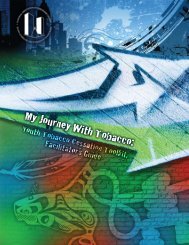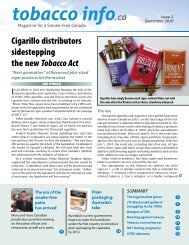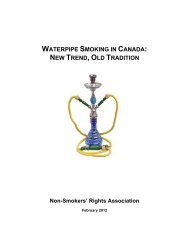Tobacco-Free Sports and Recreation Policies
Tobacco-Free Sports and Recreation Policies - New Brunswick Anti ...
Tobacco-Free Sports and Recreation Policies - New Brunswick Anti ...
Create successful ePaper yourself
Turn your PDF publications into a flip-book with our unique Google optimized e-Paper software.
<strong>Tobacco</strong>-<strong>Free</strong> <strong>Sports</strong> <strong>and</strong> <strong>Recreation</strong> <strong>Policies</strong><br />
EXECUTIVE SUMMARY<br />
Since 2008, Ontario’s seven <strong>Tobacco</strong> Control Area Network (TCAN) regions have been engaged in<br />
promoting tobacco-free sports <strong>and</strong> recreation (TFSR) policies. They have undertaken a variety of<br />
initiatives to support sport <strong>and</strong> recreation organizations in the adoption of TFSR policies <strong>and</strong> in<br />
developing signage. TCANs face particular challenges in local hockey settings where resources<br />
are limited <strong>and</strong> communities rely on volunteers.<br />
The main goal of this evaluation was to explore the implementation <strong>and</strong> impact of TFSR policies<br />
within the sport of hockey in four Ontario public health units (PHUs) <strong>and</strong> examine the barriers<br />
<strong>and</strong> facilitators in TFSR policy implementation. This report is intended to serve as a practical,<br />
experience-oriented resource for the TFSR Community of Practice <strong>and</strong> other interested<br />
stakeholders to consider when moving forward in the area of TFSR policy implementation.<br />
Specific evaluation questions:<br />
• What TFSR policies are being implemented in hockey organizations <strong>and</strong> teams within<br />
PHUs in Ontario?<br />
• What is the level of awareness <strong>and</strong> support of these policies within organizations, <strong>and</strong><br />
among team members, parents, coaches <strong>and</strong> spectators?<br />
• What is the impact of implementing TFSR policies on individual behaviours <strong>and</strong> in<br />
communities (e.g., player, parent <strong>and</strong> coach smoking behaviour, exposure to secondh<strong>and</strong><br />
smoke, social modelling, youth perceptions of smoking, environmental protection, <strong>and</strong><br />
smoking cessation)?<br />
• What are the barriers <strong>and</strong> facilitators to implementing TFSR policies at the organizational<br />
level?<br />
• What are the barriers <strong>and</strong> facilitators to implementing <strong>and</strong> enforcing TFSR policies at the<br />
team level?<br />
The four case studies reflect a range of age, sex <strong>and</strong> geography in the Ontario hockey<br />
community. They are:<br />
• Case Study I–Peewee/Bantam teams (2 teams)<br />
• Case Study II–Women’s League team<br />
• Case Study III–Junior B team<br />
• Case Study IV–University team<br />
Ontario <strong>Tobacco</strong> Research Unit 1





